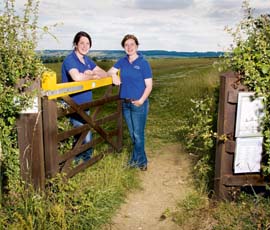FW Awards 2011: Countryside Farmer of the Year finalists – Fay Smith and Abigail Johnson

Fay Smith and Abigail Johnson
Rectory Farm, Great Easton, Leicestershire
Fay Smith and Abigail Johnson are only too aware of how lucky they are to live and work in a beautiful part of the countryside.
The sisters farm in partnership with their father Philip Johnson and mother Sue on a 395ha tenanted unit on the Rutland/Leicestershire border. With views across the farm over the Eyebrook reservoir, a piece of water used by the Dambuster crews to practise, it is a stunning location which the whole family feels compelled to allow others to enjoy.
“We feel we have been so lucky to grow up in this house and on this farm and it is a privilege we want to share,” says Fay. “We have always been very keen to share the farm with the public and are passionate about encouraging the public to come on to the farm.”
And it is not just words. Over the past year the sisters have hosted 19 walks, welcoming local villagers, bird-watching groups and other farmers to their home for an opportunity to see how commercial farming can go hand-in-hand with environmental management.
The arable and sheep farm is in the ninth year of a Countryside Stewardship Scheme, which they are hoping can be converted into a Higher Level Stewardship agreement in 2012.
Under CSS, the farm has introduced about 8.5km of permissive paths which are well-used by walkers. Over the past decade the family has also planted over a mile of new hedgerows, splitting three large fields into six smaller ones, and bordered most of the fields with either 6m or 3m grass margins to act as wildlife corridors.
About 5ha of land is left as overwintered stubbles to provide sites for ground-nesting birds such as lapwings. With the help of a local bird watching group the family has also installed 20 bird boxes in spinneys planted back in the 1980s. These are being monitored every year to record the nesting activity of the sparrows that use them.
A list of the extensive range of bird species found on the farm is usefully displayed on the gate for walkers as they enter the property.
The farm is a member of the RSPB Farmer Alliance, which conducts bird counts on the farm every four years. At the last count in 2008 there were 47 species of bird on the farm, nine of which were on the RSPB’s red list and eight on the amber.
“We put the bird count results up as when people go for a walk we want them to think about what we are doing and what they can see,” says Fay.
To add another income stream the sisters have diversified into a wild birdseed enterprise which dovetails into the rest of the business by utilising wheat, OSR and millet grown on the farm. This part of the business is largely managed by Abigail, who also takes charge of the farm’s flock of 200 breeding ewes.
The rest of the wheat is grown with the aim of selling it to local processors in Corby and Kettering, which cuts down on unnecessary haulage around the country. Reducing carbon emissions is a big goal for Fay, who takes the lead on the arable enterprise and is her local NFU’s arable link representative. She applies minimum cultivation techniques across the farm to cut down on fuel use, which also brings environmental benefits. Each year the hours on the tractors are also recorded with the aim of reducing them by 5% each year.
As the only farm left in the centre of the village, Fay and Abigail play an active role in village life hosting village parties and the annual Rogation Service in the barn. Rectory Farm, and the family who live there, are clearly at the heart of their local community both physically and metaphorically.
Farm facts
395ha of predominately arable land
Countryside Stewardship agreement
8.5km of permissive access
Diversified into wild birdseed
The judges liked
* Supplying local markets with grain
* Sensible approach to succession planning
* Genuine enthusiasm for environmental work
* Work with wildlife groups to develop their understanding
2011 Farmers Weekly Awards
